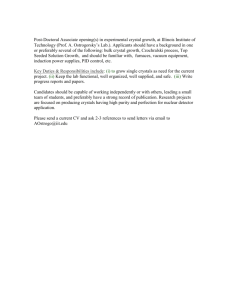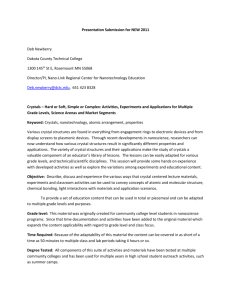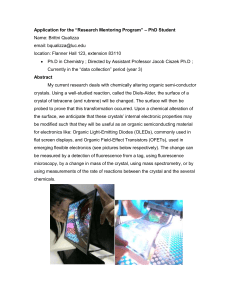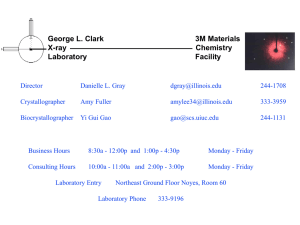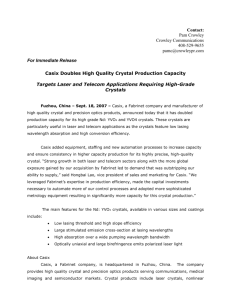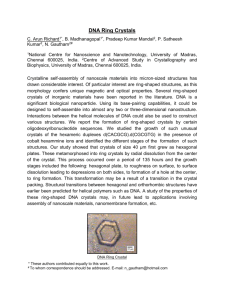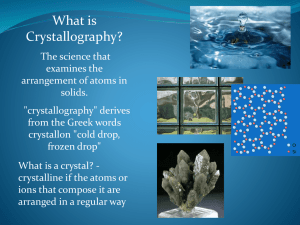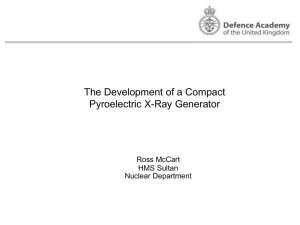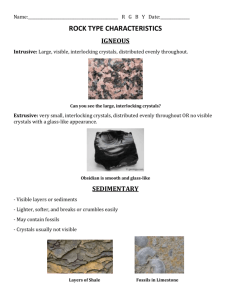Why Liquid Crystals Form?
advertisement
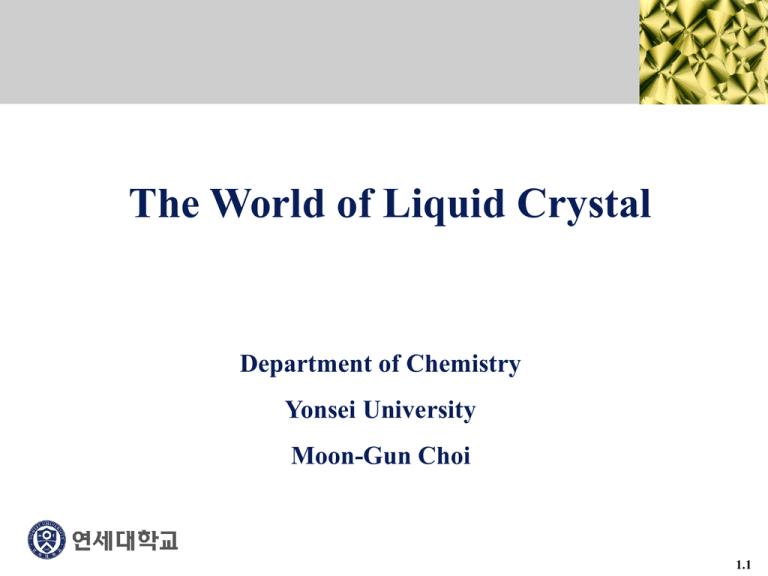
The World of Liquid Crystal Department of Chemistry Yonsei University Moon-Gun Choi 1.1 Discovery of Liquid Crystals The end of the 19th century Austrian botanist Friedrich Reinitzer to study the role of cholesterol in plants 1.2 Discovery of Liquid Crystals Otto Lehmann, examined the cloudy ‘in-between phase’ “mesophase” 1.3 Identifying a Liquid Crystal Polarizing Optical Microscope DSC(Differential Scanning Calorimeter) 0 50 100 150 200 250 1.4 Why Liquid Crystals Form? Uneven distribution of electrons in the molecule Intermolecular forces Strong enough to cause the molecule line up in the same overall direction but not strong enough to hold them firmly in one place (over a certain range of temperatures) 1.5 Why Liquid Crystals Form? The Fourth State of Matter 1.6 Types of Liquid Crystals 1.7 Liquid Crystal Display Industry 1.8 The Chemistry of Liquid Crystals Understand which factors of the molecular structure give rise to LC behavior. Tailor the molecules they made to give them the properties required for useful applications. Align parallel to an electric field Liquid crystal phase over a large temperature range High chemical stability 1.9 The Liquid Crystals that Revolutionized the Display Industry 1.10 The Polymer Dispersed Liquid Crystal(PDLC) Display (SMART WINDOW) 1.11 Discotic Liquid Crystal Materials and Molecular Wires 1.12 Types of Columnar LC Phases 1.13 Schematic Representation of Five Discotic Phases 1.14 Various phases of calamatics and discotics molecules 1.15 Lyotropic Liquid Crystal LC behavior depends upon the concentration in solution > 1.16 Thermotropic Liquid Crystal LC behavior depends upon the temperature 1.17 Properties of Metallomesogen Various 3-D Structure Ferroelectric Property NLO Property Paramagnetic Property by forming stable radical 1.18 Publications on Metallomesogen 1.19 Examples of Metallomesogen 1.20 Examples of Metallomesogen H 2n+ 1 C n O H 2n+ 1 C n O COCl CO CO 2 Fe + OH 2 COCl H 2n+ 1 C n O NEt 3 CH 2 Cl 2 OC n H 2n+ 1 CO H 2n+ 1 C n O H 2n+ 1 C n O 2 CO 2 O 2C OC n H 2n+ 1 Fe CO 2 O 2C Crystal Bicontinuous cubic (bcc) Columnar Isotropic liquid OC n H 2n+ 1 O 2C o Temperature( C ) H 2n+ 1 C n O 4 a ~ g (a :n = 6 , b :n = 8 , c :n = 1 0 , d :n = 1 2 , e :n = 1 4 , f:n = 1 6 , g :n = 1 8 ) Fe 1.21 Applications of Liquid Crystals 1.22 Applications of LC Display Device 1.23 Ferroelectric, Antiferroelectric LC Ferroelectric permanent dipole moment in the absence of an external electric filed. Ferroelectricity of smectic C* switch very quickly (μs vs ms) Antiferroelectric tilt direction alternates between layers 1.24 Liquid Crystal Polymers 1.25 Soaps and Detergents as an Example of LC 1.26 Liquid Crystals in Nature 1.27 Semi-flexible Main-Chain Polymer 1.28 Side-Group LC Polymers for Optical Memories 1.29 Liquid Crystals and Life 1.30 Liquid Crystals and Life 1.31
